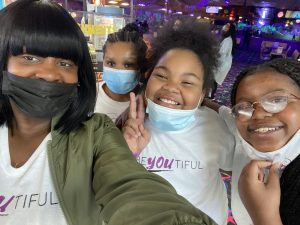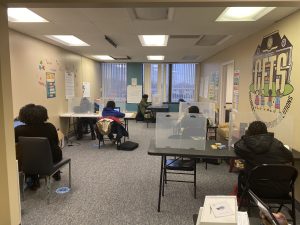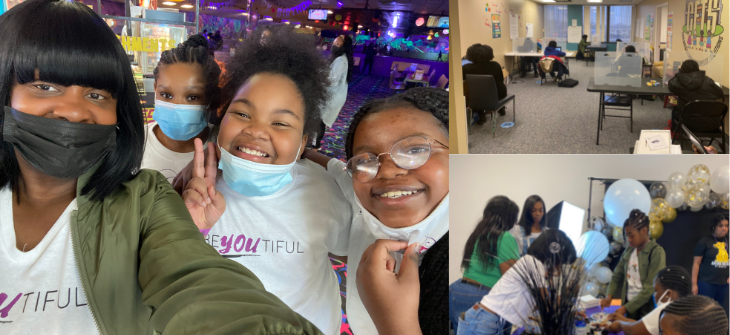Angela Flowers and her fellow co-founders of Making a Difference Consulting, Meleika Wadley and Dr. Dakota King-White, were helping young people and families in Greater Cleveland cope with stress long before COVID-19. The pandemic may have ushered in a new suite of challenges to our social-emotional wellbeing, but their mission remains the same.
“We want to empower families holistically,” says Flowers, a licensed social worker and community activist, who along with Wadley and King-White established Making a Difference 14 years ago. “We offer a safe space to help boost confidence and identify coping skills to help people deal better with stressors as they occur.”

Students in Making a Difference’s Demonstrating Inner Value, Acceptance & Self-worth (DIVAS) program.
Flowers and her colleagues work directly with children and families throughout Northeast Ohio, and Making a Difference partners with school districts across the region, providing a variety of in-school and after school programming, from anti-bullying initiatives to entrepreneurship classes to mental health professional development for educators.
The pandemic’s impact has been felt in practically every corner of life, and Flowers and her colleagues have seen the emotional toll it’s taking on Greater Cleveland’s families.
“Before COVID, there was plenty of regular stress,” says Flowers. She saw families dealing with financial stress and health issues before the pandemic as well as students coping with anxiety over testing and peer pressure. “When COVID came, these other social issues didn’t stop—the pandemic magnified them.”
Flowers and her colleagues saw an uptick in families under financial pressure because of pandemic-related layoffs and business closures. And on top of the usual social and academic stressors, Flowers has seen new anxieties impacting her young clients.
“We found that, in addition to being lonely and isolated, kids were struggling with worry—fears they would catch the virus or bring it home to their families,” she says. “We were working with parents who’d lost jobs and financial security, and those who were feeling frustrated because they didn’t have the computer savvy to help their kids with their virtual schoolwork.”

Making a Difference organized an academic learning pod to support students learning remotely during the pandemic.
At the onset of the pandemic, Making a Difference quickly pivoted—redesigning its programming to be delivered virtually so Flowers and her colleagues could keep connected to families who needed support. In addition to virtual programs that taught kids everything from cooking to art therapy to entrepreneurship, Making a Difference organized an academic learning pod that served 18 Euclid students.
Feedback was overwhelmingly positive, says Flowers. “We even had kids logging on early to our virtual programs because they were looking forward to that connection.”
This summer, Flowers and her colleagues are launching a series of virtual and in-person programs to offer even more opportunities for Greater Cleveland families to address their social-emotional health. While her team is excited to be able to return to in-person offerings, the virtual platform has allowed Making a Difference to reach more families by removing barriers like transportation, according to Flowers.
More than a year into the pandemic, social-emotional health remains a key concern for Greater Cleveland families and communities. “Kids model what they see,” Flowers says. “If the adults in their lives are not able to manage stress in a healthy way, they’ll pick that up.”
And a healthy emotional state has a ripple effect across other areas of a student’s life, she adds. “When young people feel better, and can manage their emotions and feelings, their grades improve as well.”
Want to help? Visit www.makingadifferenceconsulting.com to learn more about volunteer opportunities.


